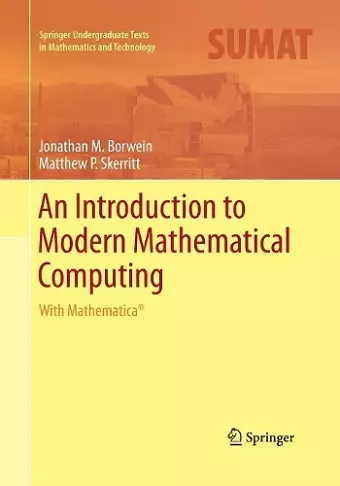An Introduction to Modern Mathematical Computing
With Mathematica®
Jonathan M Borwein author Matthew P Skerritt author
Format:Paperback
Publisher:Springer-Verlag New York Inc.
Published:23rd Aug '16
Currently unavailable, and unfortunately no date known when it will be back

Thirty years ago mathematical, as opposed to applied numerical, computation was difficult to perform and so relatively little used. Three threads changed that: the emergence of the personal computer; the discovery of fiber-optics and the consequent development of the modern internet; and the building of the Three “M’s” Maple, Mathematica and Matlab.
We intend to persuade that Mathematica and other similar tools are worth knowing, assuming only that one wishes to be a mathematician, a mathematics educator, a computer scientist, an engineer or scientist, or anyone else who wishes/needs to use mathematics better. We also hope to explain how to become an "experimental mathematician" while learning to be better at proving things. To accomplish this our material is divided into three main chapters followed by a postscript. These cover elementary number theory, calculus of one and several variables, introductory linear algebra, and visualization and interactive geometric computation.
From the reviews:
“There are two general approaches to computation: using computation as a numerical tool to approximate answers or using a computer algebra system to provide exact mathematical answers by symbolic manipulation. This book explores the second of these approaches, using the computer algebra system Mathematica. … Though this work does teach students how to use Mathematica, it does so with the goal of providing new insights into basic mathematics, which can then be applied to more advanced mathematics. … Summing Up: Recommended. Lower- and upper-division undergraduates.” (D. Z. Spicer, Choice, Vol. 50 (7), March, 2013)
“Three main chapters form the core of the book. In the first chapter, the authors talk about using a computer algebra system like Mathematica for problems in number theory … . Chapters 2 and 3 are devoted to calculus and linear algebra, respectively. … The mathematical content of the chapters is … elementary and written in a style easily understandable by nonspecialists. … a very good introduction for beginners to this interesting and important topic.” (Kai Diethelm, ACM Computing Reviews, March, 2013)
ISBN: 9781493942954
Dimensions: unknown
Weight: 631g
224 pages
Softcover reprint of the original 1st ed. 2012